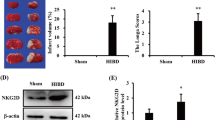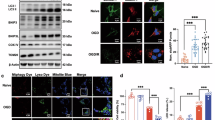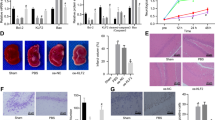Abstract
Activated nuclear factor-κB (NFκB) has been shown to increase transcription of several genes that could potentially contribute to neuronal damage, such as proinflammatory cytokines, chemokines, and inducible nitric oxide synthase. The aim of our study was to investigate whether inhibition of NFκB activation could prevent hypoxia/ischemia (HI)-induced cerebral damage in neonatal rats. We used a cell permeable peptide (NEMO binding domain [NBD] peptide) that is known to prevent the association of the regulatory protein NEMO with IKK, the kinase that activates NFκB. Via this mechanism, the NBD peptide can specifically block the activation of NFκB, without inhibiting basal NFκB activity. Cerebral HI was induced in neonatal rats by occlusion of the right carotid artery followed by 90 min of hypoxia (Fio2 = 0.08). Immediately upon reoxygenation, as well as 6 and 12 h later, rats were treated with vehicle or NBD peptide (20 mg/kg i.p.). Histologic analysis of brain damage was performed at 6 wk after HI. To assess NFκB activation, electromobility shift assays (EMSAs) were performed on brain nuclear extracts obtained 6 h after reoxygenation. Increased NFκB activity could be shown at 6 h after HI in both hemispheres. Peripheral administration of NBD peptide prevented this HI-induced increase in NFκB activity in both hemispheres. Histologic analysis of long-term cerebral damage revealed that inhibition of NFκB activation by administration of NBD peptide at 0, 6, and 12 h after HI resulted in an increment of neuronal damage. In conclusion, our data suggest that inhibition of NFκB activation using NBD peptide early after HI increases brain damage in neonatal rats.
Similar content being viewed by others
Log in or create a free account to read this content
Gain free access to this article, as well as selected content from this journal and more on nature.com
or
Abbreviations
- EMSA:
-
electromobility shift assay
- HI:
-
hypoxia/ischemia
- NBD peptide:
-
NEMO binding domain peptide
- NEMO:
-
NFκB essential modifier
- NFκB:
-
nuclear factor-κB
References
Dilenge ME, Majnemer A, Shevell MI 2001 Long-term developmental outcome of asphyxiated term neonates. J Child Neurol 16: 781–792
Simon NP 1999 Long-term neurodevelopmental outcome of asphyxiated newborns. Clin Perinatol 26: 767–778
Peeters C, van Bel F 2001 Pharmacotherapeutical reduction of post-hypoxic-ischemic brain injury in the newborn. Biol Neonate 79: 274–280
Hamrick SE, Ferriero DM 2003 The injury response in the term newborn brain: can we neuroprotect?. Curr Opin Neurol 16: 147–154
O'Neill LA, Kaltschmidt C 1997 NF-kappa B: a crucial transcription factor for glial and neuronal cell function. Trends Neurosci 20: 252–258
Siebenlist U, Franzoso G, Brown K 1994 Structure, regulation and function of NF-kappa B. Annu Rev Cell Biol 10: 405–455
Matthews JR, Hay RT 1995 Regulation of the DNA binding activity of NF-kappa B. Int J Biochem Cell Biol 27: 865–879
Schneider A, Martin-Villalba A, Weih F, Vogel J, Wirth T, Schwaninger M 1999 NF-kappaB is activated and promotes cell death in focal cerebral ischemia. Nat Med 5: 554–559
Phillips JB, Williams AJ, Adams J, Elliott PJ, Tortella FC 2000 Proteasome inhibitor PS519 reduces infarction and attenuates leukocyte infiltration in a rat model of focal cerebral ischemia. Stroke 31: 1686–1693
Buchan AM, Li H, Blackburn B 2000 Neuroprotection achieved with a novel proteasome inhibitor which blocks NF-kappaB activation. Neuroreport 11: 427–430
Stephenson D, Yin T, Smalstig EB, Hsu MA, Panetta J, Little S, Clemens J 2000 Transcription factor nuclear factor-kappa B is activated in neurons after focal cerebral ischemia. J Cereb Blood Flow Metab 20: 592–603
Hill WD, Hess DC, Carroll JE, Wakade CG, Howard EF, Chen Q, Cheng C, Martin-Studdard A, Waller JL, Beswick RA 2001 The NF-kappaB inhibitor diethyldithiocarbamate (DDTC) increases brain cell death in a transient middle cerebral artery occlusion model of ischemia. Brain Res Bull 55: 375–386
May MJ, D'Acquisto F, Madge LA, Glockner J, Pober JS, Ghosh S 2000 Selective inhibition of NF-kappaB activation by a peptide that blocks the interaction of NEMO with the IkappaB kinase complex. Science 289: 1550–1554
Rice JE 3rd, Vannucci RC, Brierley JB 1981 The influence of immaturity on hypoxic-ischemic brain damage in the rat. Ann Neurol 9: 131–141
Hagberg H, Ichord R, Palmer C, Yager JY, Vannucci SJ 2002 Animal models of developmental brain injury: relevance to human disease. A summary of the panel discussion from the Third Hershey Conference on Developmental Cerebral Blood Flow and Metabolism. Dev Neurosci 24: 364–366
Romijn HJ, Hofman MA, Gramsbergen A 1991 At what age is the developing cerebral cortex of the rat comparable to that of the full-term newborn human baby?. Early Hum Dev 26: 61–67
van den Tweel ER, van Bel F, Kavelaars A, Peeters-Scholte CM, Haumann J, Nijboer CH, Heijnen CJ, Groenendaal F 2005 Long-term neuroprotection with 2-iminobiotin, an inhibitor of neuronal and inducible nitric oxide synthase, after cerebral hypoxia-ischemia in neonatal rats. J Cereb Blood Flow Metab 25: 67–74
Hickenbottom SL, Grotta JC, Strong R, Denner LA, Aronowski J 1999 Nuclear factor-kappaB and cell death after experimental intracerebral hemorrhage in rats. Stroke 30: 2472–2477
Tamatani M, Mitsuda N, Matsuzaki H, Okado H, Miyake S, Vitek MP, Yamaguchi A, Tohyama M 2000 A pathway of neuronal apoptosis induced by hypoxia/reoxygenation: roles of nuclear factor-kappaB and Bcl-2. J Neurochem 75: 683–693
Culmsee C, Siewe J, Junker V, Retiounskaia M, Schwarz S, Camandola S, El Metainy S, Behnke H, Mattson MP, Krieglstein J 2003 Reciprocal inhibition of p53 and nuclear factor-kappaB transcriptional activities determines cell survival or death in neurons. J Neurosci 23: 8586–8595
Yu Z, Zhou D, Bruce-Keller AJ, Kindy MS, Mattson MP 1999 Lack of the p50 subunit of nuclear factor-kappaB increases the vulnerability of hippocampal neurons to excitotoxic injury. J Neurosci 19: 8856–8865
Kassed CA, Willing AE, Garbuzova-Davis S, Sanberg PR, Pennypacker KR 2002 Lack of NF-kappaB p50 exacerbates degeneration of hippocampal neurons after chemical exposure and impairs learning. Exp Neurol 176: 277–288
Carroll JE, Howard EF, Hess DC, Wakade CG, Chen Q, Cheng C 1998 Nuclear factor-kappa B activation during cerebral reperfusion: effect of attenuation with N-acetylcysteine treatment. Brain Res Mol Brain Res 56: 186–191
Hudome S, Palmer C, Roberts RL, Mauger D, Housman C, Towfighi J 1997 The role of neutrophils in the production of hypoxic-ischemic brain injury in the neonatal rat. Pediatr Res 41: 607–616
Mattson MP, Culmsee C, Yu Z, Camandola S 2000 Roles of nuclear factor kappaB in neuronal survival and plasticity. J Neurochem 74: 443–456
Author information
Authors and Affiliations
Corresponding author
Rights and permissions
About this article
Cite this article
van den Tweel, E., Kavelaars, A., Lombardi, M. et al. Selective Inhibition of Nuclear Factor-κB Activation After Hypoxia/Ischemia in Neonatal Rats Is Not Neuroprotective. Pediatr Res 59, 232–236 (2006). https://doi.org/10.1203/01.pdr.0000196807.10122.5f
Received:
Accepted:
Issue date:
DOI: https://doi.org/10.1203/01.pdr.0000196807.10122.5f



